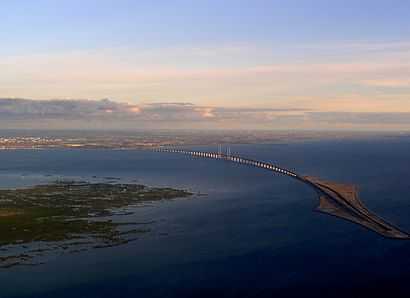Oresund Line
| Oresund Line | |
|---|---|
 The Oresund Bridge | |
| Overview | |
| Type | High-speed railway |
| System |
Danish railways Swedish railways |
| Termini |
Fosieby Copenhagen Central Station |
| Stations | 4 |
| Operation | |
| Opening | 2000 |
| Owner |
Swedish Transport Administration Banedanmark |
| Operator(s) |
DSB DSB Øresund SJ Skåne commuter rail Railion |
| Character | Passenger and freight |
| Rolling stock |
SJ X2 SJ 2000 IC3 (X31) EG |
| Technical | |
| Line length | 38 km |
| Track length | 76 km |
| No. of tracks | Double |
| Track gauge | 1,435 mm (4 ft 8 1⁄2 in) |
| Electrification |
15 kV 16 2⁄3 Hz AC 25 kV 50 Hz AC |
Oresund Line (Swedish: Öresundsbanan, Danish: Øresundbanen) is a railway between Copenhagen in Denmark and Malmö in Sweden via the Oresund Bridge. On the Swedish side it is managed by the Swedish Transport Administration, on the Danish side by Banedanmark.
The railway line continues from the Continental Line south of Malmö and heads west passing over the Oresund Bridge on the lower section, Peberholm artificial island and under Copenhagen Airport to Copenhagen Central Station. In Malmö, the City Tunnel connects the railway directly to Malmö C.
IC3 Oresundtrains are operated by a venture between DSB Øresund and Veolia Transport between Copenhagen and Malmö, with connections to Gothenburg, Kalmar and Karlskrona. On the Danish side, many trains continue northwards on the Coast Line to Helsingør. DSB operates Oresundtrains to Ystad with ferry connection to Bornholm. SJ operates SJ 2000 high-speed trains between Stockholm, Malmö and Copenhagen, and Oresundtrains between Gothenburg and Copenhagen. Freight trains are operated by Railion using EG locomotives.
History
Plans for connecting Scania and Zealand with a bridge had been raised throughout the entire 20th century, and in 1991 a company was created to start the work. Construction of the Oresund Bridge and Oresund Railway started in 1995 and was completed in 2000. According to UIC this rail line had in 2012 the most expensive second class rail tickets in Europe with a price of .21 Euro per km.[1] The investigation encompassed 103 rail lines.[1] This price is calculated on the distance Malmö-Köpenhamn of 52,7 km which doesn't include the shortening by Citytunneln and which made the per-km price higher than that of the Eurostar.[1]
City Tunnel
Since December 2010, Oresundtrains have gone through the City Tunnel in Malmö, with its stations at Hyllie and Triangeln, thereby saving one minute for passengers to Malmö C and about 15 to 20 minutes for passengers to Triangeln.
Border technicalities
One of the challenges with the line was the incompatibility between the railway electrification systems in Denmark and Sweden. Denmark uses 25 kV 50 Hz AC while Sweden uses 15 kV 16 2⁄3 Hz AC. The signalling systems in the two countries are also different. The problems were overcome by switching the signalling system on Peberholm, while the entire bridge uses the Danish electrical system. All trains operating on the line must therefore be dual voltage and have dual signalling systems, including a minority of the X2 trains operated throughout Sweden by SJ. The Danish signalling system is only approved for 180 km/h speed, while the Swedish system is approved for 200 km/h. The entire bridge has 200 km/h maximum speed, also the Danish part, as the only railway in Denmark.
On double-track lines in Denmark trains run on the right whereas in Sweden they run on the left. On the Oresund Line trains runs on the right hand track, changing sides at a flyover north of the Malmö C, resulting in trains in the Malmö area using the Danish standard.
Line
 Sweden
Sweden
- Fosieby (0 / 38 km) – line leaves Continental Line
- Malmö South Station (4 / 34 km)
- Lernacken (10 / 28 km) – Enter the Oresund Bridge, change of electric current.
 Denmark
Denmark
- Peberholm (21 / 17 km) – Change of signalling system
- Copenhagen Airport, Kastrup Station (29 /9 km)
- Tårnby Station (31 / 7 km)
- Ørestad Station (32 / 6 km) – Metro crosses the Oresund Railway
- Copenhagen Central Station (38 / 0 km) - terminus
X2000 trains stop only at Malmö C, Copenhagen Airport/Kastrup and Copenhagen H. Oresundtrains stop at all stations.
External links
References
- ↑ 1.0 1.1 1.2 Magnusson, Erik. "(swedish) Tåget över bron dyrast i Europa". Sydsvenskan. Retrieved 15 November 2014.